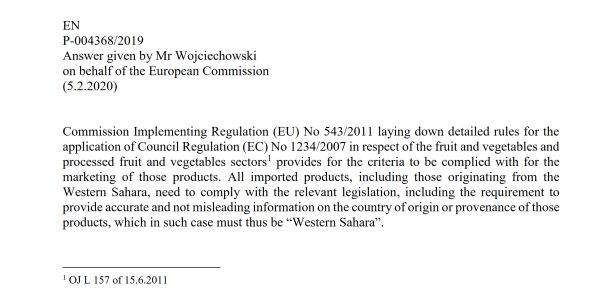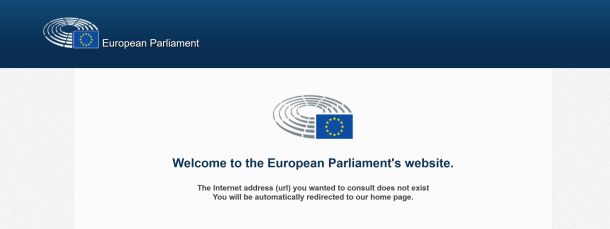
The proposed trade scheme for occupied Western Sahara denies EU consumers the right to know the true origin of covered products, just like it failed the right of the people of Western Sahara to decide whether they wanted the deal in the first place.
"It is not our preferred solution”, EU Commissioner for Taxation Pierre Moscovici wrote in his letter to the European Parliament’s trade committee (INTA) dated 6 December 2018. The letter concerned Morocco’s flat-out rejection to set up a transparent mechanism that would allow for the tracing of products exported by Morocco from the part of Western Sahara that it holds under occupation into the EU single market – something the INTA committee and particularly the S&D Group and the previous INTA rapporteur had initially insisted on.
Sources in INTA confirm that Morocco has made it very clear, including to INTA, that it will not label any of the products that originate in Western Sahara as coming from that territory, but rather as from "Morocco".
As a result, EU consumers will remain in the dark as to the true origin of the fruits and vegetables or processed fish products available in shops across the Union, imported by the EU from one of the world’s veritable human rights black spots through a deal with the occupying regime.
This goes directly against binding EU legislation which stipulates that “indication of the country of origin or place of provenance shall be mandatory where failure to indicate this might mislead the consumer as to the true country of origin or place of provenance of the food, in particular if the information accompanying the food or the label as a whole would otherwise imply that the food has a different country of origin or place of provenance”. (Article 26 of EU Regulation 1169/2011 on the provision of food information to consumers, 2(a), “country of origin or place of provenance”). The Commission itself stated to the Parliament's Petitions Committee in February 2017 that indicating the origin of food is obligatory, following a question on products entering the EU market from third countries.
It should be noted that the EU Commission has no hesitations to impose the correct labeling of origin when coming from a country as strong and powerful as Israel. To offer clarity to EU consumers, traders and natitional customs authorities, the EU Commission has adopted a Notice on products coming from Israeli settlements in order to correctly apply EU legislation on the labelling of products originating in these territories. But the Commission seems to believe that what applies to all countries in the world, including Israel, does not apply to Morocco when it comes to products from the parts of Western Sahara that are occupied.
Instead of a transparent mechanism, Morocco now offers the EU Commission and Member States’ customs authorities access to a database that would contain information on what “region” a product imported by the EU would come from. However, the administrative regions that Morocco illegally imposed on Western Sahara do not correspond to the territory as it is internationally recognized, nor to the reality on the ground.
There are three such regions that span Western Sahara. Two of those – Dakhla-Oued Eddahab and Layoune-Sakia El Hamra – consist of land on both sides of the military fortified wall that Morocco built across the length of Western Sahara. So they include land that is under Moroccan occupation, but also land that Morocco does not control at all – the so-called liberated zone that is under control of Polisario, east of the Berm. The region of Guelmim-Oued Noun spans the border between Morocco and Western Sahara and as such contains land that is in occupied Western Sahara, but also land that is in Morocco proper.
Article continues under graphic.

In its Staff Working Document accompanying the trade proposal, the EU Commission itself noted that "the territory of Western Sahara does not correspond exactly to the ‘southern provinces’ referred to by the Moroccan authorities in their publications or in information exchanged with the Commission".
A system that gives EU and Member States’ institutions access to Morocco’s regional data, still does not give a correct idea as to the true origin of products. And as all products will be exported as from Morocco, EU consumers are completely deprived of any knowledge regarding origin at all.
Yet the EU Commission has agreed to Morocco’s meager proposal, inking it through an exchange of letters between DG Taxud’s director Sabine Henzler and the Moroccan Ambassador to the EU Réda Chami. Nevertheless, nothing will be set up by the time the European Parliament is expected to vote on the proposal: all Parliament has to go by, is a promise that Morocco will at some point allow access to a sketchy database, that even the responsible EU Commissioner considers to be insufficient.
MEPs on the barricades for correct reporting on origin - torpedoed by INTA Chair and Spanish S&D
A group of MEPs has however tabled an amendment aimed at protecting consumers' rights. On 16 January, the Parliament will vote on the trade proposal on the basis of a report drafted by ALDE rapporteur Lalonde but taken over by her liberal colleague MEP Marietje Schaake (Netherlands) following the resignation of the former after serious conflict of interest allegations.
The Schaake (former Lalonde) report completely ignores consumer rights regarding origin. As it stands, the paragraph proposed by Schaake on traceability reads as follows:
"Emphasises that a key criterion for Parliament before giving its consent to the agreement is to ensure that a mechanism will be put in place for Member States' customs authorities to have access to reliable information on products originating in Western Sahara and imported into the EU, in full compliance with EU customs legislation; emphasises that such a mechanism will make available detailed and disaggregated statistical data provided timely on such exports; recognises the efforts made by the Commission and Morocco to try to find a solution to this request and calls on them to implement such mechanism; calls on the Commission to use all corrective measures available should the implementation of the agreement not be satisfactory;"
A group of MEPs comprised of S&Ds and Greens, proposes to amend that paragraph so that it ensures the respect of EU consumer protection legislation. The paragraph would then read (proposed changes in bold):
"Emphasises that a key criterion for Parliament before giving its consent to the agreement is to ensure that a reliable traceability mechanism is in place in order for EU consumers and Member States to clearly identify products originating in Western Sahara and imported into the EU, in full compliance with EU customs and consumer protection legislation; calls on the Commission to use all corrective measures available should the implementation of the agreement not be satisfactory; calls on the Commission to present to this Parliament an annual evaluation to assess the conformity of this mechanism with the EU customs and consumer protection legislation."
However, in response to the this initiative, a counter-amendment to aimed at preventing EU consumers to know whether a product comes from Morocco or from Western Sahara has been presented by the Chair of the INTA Committee, German socialist Bernd Lange, and Spanish socialist Elena Valenciano. Their proposed amendment omits all references to consumer rights that the Greens and Socialists had proposed - a political move to water down the efforts made to strengthen the Schaake report in terms of traceability; something even EU Commissioner Moscovici (of S&D signature himself) considers to be an issue.
On 10 January 2019, in the afternoon, an interesting last minute amendment was introduced to the report by rapporteur Schaake which is of a positive nature.
The amendment calls on the European Commission "to explore ways in which trade preferences can be effectively granted in the future to the entirety of the people living in the Western Sahara". While it is difficult enough for Saharawis to take part in the Moroccan-owned economy in their occupied homeland, this detail does implicitly recognize that half of the Saharawi people currently are completely excluded from the trade deal, which is signed with the neighbouring country of Morocco. By making this distinction, Schaake fundamentally departs from her predecessor.
The Court of Justice refers to the consent of the "people of" Western Sahara, meaning just as much the refugees. Half the people of Western Sahara are refugees, but use the non-occupied territories for trade, herding and agriculture. 94 Saharawi and pro-Saharawi groups that objected to the deal, are claimed to have supported it by the EEAS.
EU Commission backtracks on labelling Western Sahara goods
What is EU's position on labelling of products from occupied Western Sahara? The EU Commission has now for the third time published a response to a parliamentary question on the matter, but the latest version fails to address the question.
Why does this EU statement keep disappearing?
A clarification by the EU Commission on labelling of products from Western Sahara was published, then removed, then published again and has now been removed again from EU websites.
EU reaffirms: Western Sahara products to be labelled as such
Two weeks ago, the EU Commission announced that products from Western Sahara should be labelled accordingly, only to withdraw that statement the very next day. Today, the Commission reaffirms its original position.
Spectacular backtracking by EU Commission on Western Sahara labelling
On 5 February 2020, the EU Commission announced that products from Western Sahara should be labelled accordingly. But about 24 hours later, all traces to that statement had been removed from EU websites.



